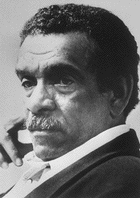Midsummer, TobagoBroad sun-stoned beaches.
White heat.
A green river.
A bridge,
scorched yellow palms
from the summer-sleeping house
drowsing through August.
Days I have held,
days I have lost,
days that outgrow, like daughters,
my harbouring arms.
Derek Walcott****************

Derek Alton Wolcott (West Indian poet and playwright) is the third black to receive the ($1.2 million) Nobel Prize for Literature (1992). He was born Jan. 23, 1930, Castries, Saint Lucia , one of the Windward Islands in the Lesser Antilles. The experience of growing up on the isolated volcanic island, an ex-British colony, has had a strong influence on Walcott's life and work. Both his grandmothers were said to have been the descendants of slaves. His father, a Bohemian watercolourist, died when Derek and his twin brother, Roderick, were only a few years old. His mother ran the town's Methodist school. After studying at St. Mary's College in his native island and at the University of the West Indies in Jamaica, Walcott moved in 1953 to Trinidad, where he has worked as theatre and art critic. He began writing poetry at an early age, at the age of 18, he made his debut with 25 Poems (1948), but his breakthrough came with the collection of poems, In a Green Night (1962). In 1959, he founded the Trinidad Theatre Workshop which produced many of his early plays., and he is noted for works that explore the Caribbean cultural experience.
Walcott is of mixed black, Dutch, and English descent. He was educated at St. Mary's College, St. Lucia, and at the University of the West Indies in Jamaica.taught at schools in St. Lucia and Grenada, and contributed articles and reviews to periodicals in Trinidad and Jamaica. Productions of his plays began in St. Lucia in 1950, and he studied theatre at Jose Quintero's acting school in New York City in 1958-59. He lived thereafter in Trinidad and the United States, teaching for part of the year at Boston University.
Walcott won the prestigious MacArthur Foundation "genius" award in 1981. He joined the Boston University faculty as a professor of poetry and playwriting that year. The next year he was a visiting professor at Harvard University, but his term ended in a cloud of controversy. A freshman student complained that he had sexually harassed her and given her a C when she resisted. At the time, Harvard dean Henry Rosovsky said he would be "reluctant" to reappoint Walcott, who returned to BU.
Walcott is best known for his poetry, beginning with In a Green Night: Poems 1948-1960 (1962). This book is typical of his early poetry in its celebration of the Caribbean landscape's natural beauty. The verse in Selected Poems (1964), The Castaway (1965), and The Gulf (1969) is similarly lush in style and incantatory in mood as Walcott expresses his feelings of personal isolation, caught between his European cultural orientation and the black folk cultures of his native Caribbean. Another Life (1973) is a book-length autobiographical poem. In Sea Grapes (1976) and The Star-Apple Kingdom (1979), Walcott uses a tenser, more economical style to examine the deep cultural divisions of language and race in the Caribbean. The Fortunate Traveler (1981) and Midsummer (1984) explore his own situation as a black writer in America who has become increasingly estranged from his Caribbean homeland. Walcott's Collected Poems, 1948-1984, was published in 1986. In his book-length poem Omeros (1990), he retold the dramas of Homer's Iliad and Odyssey in a 20th-century Caribbean setting.
Of Walcott's approximately 30 plays, the best known are Dream on Monkey Mountain (produced 1967), Ti-Jean and His Brothers (1958), and Pantomime (1978). Many of his plays make use of themes from black folk culture in the Caribbean.
****************
RL
If you have a request for a certain Poet, post their name in the thread and I will find a poem by them and post it...
if you want to see some of my poetry, see the blog at:
http://www.myspace.com/retropaul